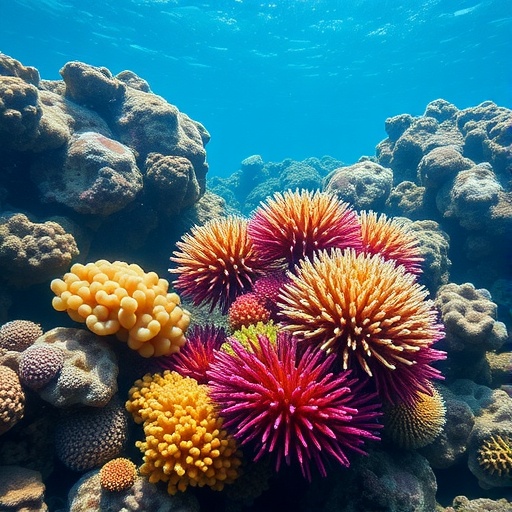In the intricate realm of marine ecology, the significance of coral reefs extends far beyond their aesthetic beauty; they serve as vital habitats for countless marine species and play a crucial role in supporting biodiversity. A recent study, published in the esteemed journal “Coral Reefs,” brings to light a compelling connection between species identity, composition, and the productivity of stony corals—a connection that not only enhances our understanding of these ecosystems but also underscores the implications of biodiversity in coral reef resilience to environmental changes.
Coral reefs, often referred to as the “rainforests of the sea,” are home to an astounding diversity of organisms. The study presented by Vetter et al. delves into the intricacies of this diversity, highlighting that not all coral species contribute equally to the overall productivity of the reef. Each species has evolved unique traits and adaptations that govern its interactions with the surrounding ecosystem. By examining various stony coral species, the researchers were able to discern patterns in how species identity influences ecological outcomes, revealing a complex tapestry of interdependencies that characterize these marine environments.
The researchers focused on specific stony coral species, known for their ecological significance and contributions to reef structure and function. By utilizing an experimental framework that combined field studies and laboratory experiments, the investigation was able to isolate variables associated with species composition and identity. The meticulous approach ensured that the data gathered could lead to actionable insights regarding coral productivity and resilience. This is particularly relevant, given the current threats faced by coral reefs, including climate change, ocean acidification, and pollution.
A central theme emerging from the research is that the composition of coral species within a reef can significantly influence overall productivity. This finding emphasizes the importance of maintaining biodiversity within these ecosystems. Coral species that thrive in synergistic combinations may enhance nutrient cycling and energy flow, leading to greater productivity. In contrast, reefs that are dominated by a limited number of species may lack the ecological resilience required to withstand environmental stressors, making them more vulnerable to collapse in the face of changing conditions.
Furthermore, the study highlights that species identity matters not just in terms of ecological function but also influences the interactions among various marine organisms that inhabit the reef. Different coral species may provide varying habitats and resources for fish, invertebrates, and other reef constituencies. The associated relationships and dependencies among species compound the role of coral in maintaining the structural integrity and health of marine ecosystems.
As scientists grapple with the threat of coral bleaching and reef degradation, understanding species-specific contributions to overall reef productivity offers a path forward. Conservation strategies that prioritize the preservation of diverse coral species may foster greater resilience to environmental shocks. The findings suggest that enhancing biodiversity within coral reefs should be a high priority for conservationists, policymakers, and marine managers alike.
The implications of the research extend beyond local reef systems. With climate change prompting shifts in marine ecosystems worldwide, understanding which coral species are most productive under varying conditions is paramount. Identifying species that can thrive even as temperatures rise or ocean chemistry changes will be critical in developing effective management strategies that aim to bolster coral populations globally.
In addition to the ecological ramifications, the study also opens avenues for future research. As scientists delve deeper into the genetic and physiological differences among coral species, new insights could emerge regarding their adaptive capacity. This could ultimately inform the development of restoration projects designed to enhance coral health and productivity by selecting the most resilient species for transplantation in degraded areas.
The researchers recognize that while their findings are substantial, there is still much more to investigate. The interaction between corals and the myriad of other species that share their environment is a dynamic and multifaceted topic; it warrants continued research. As marine ecosystems respond to the compounded effects of climate change, understanding these intricate relationships will play a pivotal role in shaping effective conservation strategies.
In conclusion, the research conducted by Vetter and colleagues serves as a clarion call for the importance of biodiversity in coral reef ecosystems. The relationship between species identity and coral productivity is not merely academic; it carries profound implications for the future of coral reefs in an era marked by environmental uncertainty. As we strive to protect and preserve these vibrant ecosystems, insights into the complex interactions among coral species will be essential in guiding our efforts toward sustainability and resilience.
As scientists continue to unearth the secrets of coral reef ecosystems, the findings of this study stand as a testament to the interconnectedness of life within the ocean. The vibrant tapestry of coral biodiversity is not just a marvel of nature; it is a vital component of planetary health. The journey of discovery in understanding coral ecosystems is ongoing, and with it comes hope for the future of these invaluable marine habitats.
Subject of Research: Coral species identity and composition and their impact on the productivity of stony corals.
Article Title: Species identity and composition affect the productivity of stony corals.
Article References:
Vetter, J., Reichert, J., Dietzmann, A. et al. Species identity and composition affect the productivity of stony corals.
Coral Reefs (2025). https://doi.org/10.1007/s00338-025-02748-0
Image Credits: AI Generated
DOI: 10.1007/s00338-025-02748-0
Keywords: Coral reefs, biodiversity, ecological resilience, species composition, marine ecosystems.




